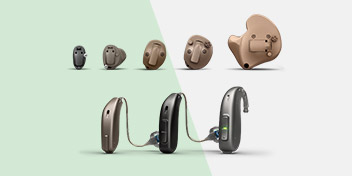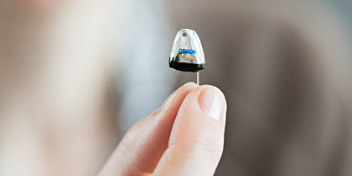Many of our hearing centres are open over Christmas. Check your local centre's opening hours and book your appointment here. Customer service & booking teams will be open on reduced hours.

What is BrainHearing™?
BrainHearing™ is a technology developed by hearing aid brand Oticon*. It helps hearing aid users get access to the full sound scene.
4 benefits of BrainHearing™

Try hearing aids with BrainHearing™
What can BrainHearing™ do for you?
Your ears collect the sounds around you. But it's your brain that processes these sounds. If you have normal hearing, you can hear all the different sounds around you. But when you have hearing loss, your brain receives less information about these sounds. When this happens, you may experience:
- Increased mental load
- Social isolation and depression
- Poor balance and fall-related injuries
- An increased likelihood of developing dementia and Alzheimer's disease
Oticon hearing aids, with their BrainHearing™ technology, give your brain access to the full sound scene. They support your brain so it works more effectively.
Having access to the full soundscape means that you can hear better with less effort.
When you hear better, your brain stays active. This is important for your health because it puts your brain at a decreased risk for cognitive decline.
Want to try a pair of hearing aids with BrainHearing™ technology for 60 risk-free days?

What makes Oticon BrainHearing™ different?
You hear with your brain. Your ears collect sound, but it’s your brain that actually understands it.
Oticon's BrainHearing™ technology focuses on understanding how the brain makes sense of sound. Hearing aids with this technology can support your brain’s natural way of working.
How does Oticon BrainHearing™ technology work?
BrainHearing™ technology in hearing aids supports the brain’s natural way of processing sound. It gives your brain access to the full soundscape. This means you can focus on the sounds that are most relevant to you. And you'll be able to understand more with less effort.
- BrainHearing™ balances the overall soundscape so that you can focus on the most important sounds around you.
- BrainHearing™ allows you to hear speech more clearly as it enhances and clarifies sources of speech near you.

How does the brain make sense of sound?
The hearing centre in the brain is made up of two subsystems: the orient subsystem and the focus subsystem.
- The orient subsystem scans the surrounding area for sounds and creates an overview of the sounds around you.
- The focus subsystem selects which sounds to focus on, while filtering out irrelevant sounds.
These two systems constantly interact to make sure that the brain’s current focus is on the most important sounds. Hearing aids with BrainHearing™ support the way in which the brain naturally processes sound. It helps make sure that you hear as much as possible, with as little effort as possible.
Advice from an expert
When it comes to hearing loss, it's important to find a solution that will work best for you – without compromise. Getting the highest level of care and finding the best solution possible can have a positive impact on your overall quality of life.
Our team of hearing care expects recommends that you select a high-quality hearing aid if you have hearing loss. High-quality hearing aids give you the full sound environment so that your brain can process sound as naturally as possible (rather than simply amplifying the sounds around you).
This leads to enhanced brain stimulation and lowers your risk for long-term health problems, such as cognitive decline.
Sources
1. Amieva, H., Ouvrard, C., Meillon, C., Rullier, L., & Dartigues, J. (2018, January 03). Death, Depression, Disability, and Dementia Associated With Self-reported Hearing Problems: A 25-Year Study. Retrieved from https://academic.oup.com/biomedgerontology/article/73/10/1383/4783130
2. Hearing aids, information on hearing loss and tinnitus. (n.d.). Retrieved from https://www.oticon.global/hearing-aid-users/blog/2019/why-healthy-hearing-is-vital-in-fighting-dementia
3. Lin, F. R.. (2011, February 1). Hearing Loss and Incident Dementia. Archives of Neurology. https://jamanetwork.com/journals/jamaneurology/fullarticle/802291.
4. Lin, F. R., & Ferrucci, L. (2012). Hearing loss and falls among older adults in the United States. Archives of internal medicine, 172(4), 369–371. https://doi.org/10.1001/archinternmed.2011.728
5. Livingston G, Huntley J, Sommerlad A, Ames D, Ballard C, Banerjee S, et al. . Dementia prevention, intervention, and care: 2020 report of the Lancet Commission. Lancet. (2020). https://www.thelancet.com/journals/lancet/article/PIIS0140-6736(20)30367-6/fulltext
6. Oticon BrainHearing™. (n.d.). Retrieved from https://www.oticon.com/your-hearing/hearing-health/brainhearing-technology
7. Rönnberg J;Lunner T;Zekveld A;Sörqvist P;Danielsson H;Lyxell B;Dahlström O;Signoret C;Stenfelt S;Pichora-Fuller MK;Rudner M;. (n.d.). The Ease of Language Understanding (ELU) model: Theoretical, empirical, and clinical advances. Retrieved from https://pubmed.ncbi.nlm.nih.gov/23874273/








